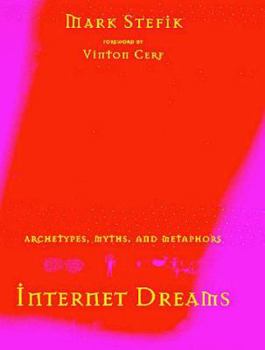Internet Dreams: Archetypes, Myths, and Metophors for Inventing the Net
Select Format
Select Condition 
Book Overview
The stakes are high - metaphors can have an impact on the legal and policy aspects of the future of the Internet as well as its technical design and economic structure. Internet Dreams illuminates not only how the Net is being created, but also stories about ourselves as our lives become electronically interconnected.
Format:Hardcover
Language:English
ISBN:0262193736
ISBN13:9780262193733
Release Date:January 1996
Publisher:MIT Press (MA)
Length:412 Pages
Weight:1.67 lbs.
Dimensions:1.2" x 6.3" x 9.3"
Customer Reviews
1 rating
An intriguing way of predicting the Internet's future
Published by Thriftbooks.com User , 27 years ago
The thesis of this fascinating book is that there is no longer any technological determinism left for the Internet because we have the ability to make the technology do whatever we want it to do. The only constraint upon its development lies in the limits of our imaginations, so what the Internet will become depends upon how we conceptualize or even `dream' about the Internet. "These dreams tap into metaphors we all use to understand our life experiences and convey deep and important messages about where we are going and what we are becoming" (p.390). His name is not mentioned but it is obvious that the influence of McLuhan lies over this book. Stefik says there are four basic metaphors which have so far shaped our thinking about the Net: the digital library (publishing and the community memory); the electronic mail metaphor (as a communication medium); the electronic marketplace (selling goods and services), and the digital world (the I-way as a gateway to experience). The selected readings have a huge historical and cultural depth which makes the book useful as an anthology alone. Stefik introduces each piece to place it in context, then after the extract he gives his own reflections. This book has some similarities to `Information and communication technologies: vision and realities', edited by William H. Dutton (OUP, 1996) but Stefik puts more emphasis on the `dreaming' of the future than Dutton, and also he has done more to classify the themes. There are also echoes of Ken Auletta's new book "The highwaymen: warriors of the information superhighway" (Random House, 1997) which makes it plain that even the heads of major computer companies don't know where we're heading. Not a book for the keyboard junkies who want to know what can be done on the Internet right now, nor is it easy reading for armchair philosophers. In fact it's hard to say who will read it, despite its intriguing content. Faculty and grad students concerned with technology and social change really must read it, and it will be a very useful book for those whose thinking takes the longer view.






